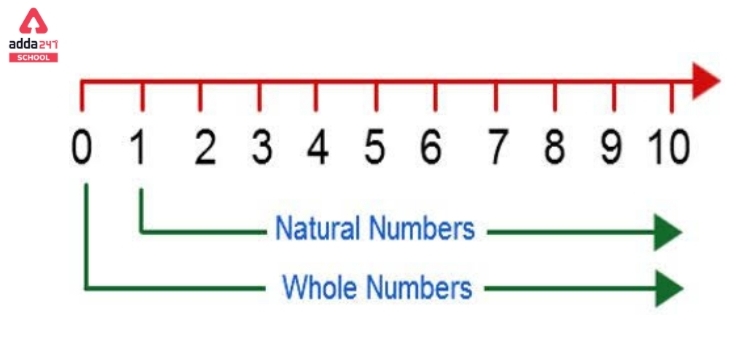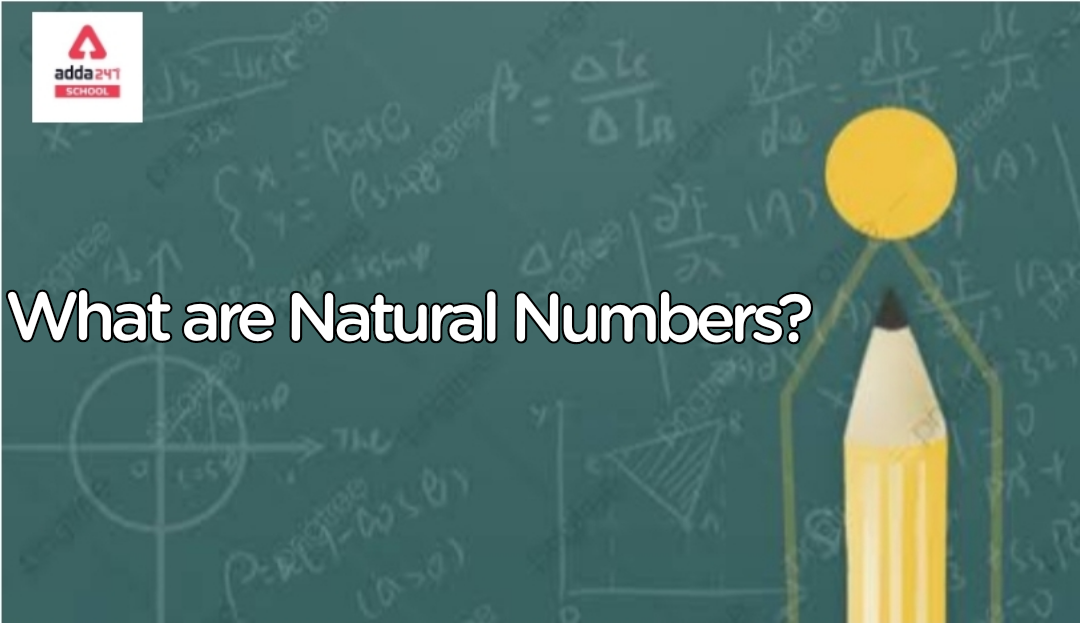Natural Numbers
As we know Number system is the fundamental stone of Mathematics. Natural Number is a part of the Number system. Positive numbers from 1 to infinity make up Natural Numbers, it does not contain zero and negative integers. Natural numbers are also known as counting numbers Because we use natural numbers while counting something. In this article, we will get a clear and detailed analysis of Natural Numbers and solve some numerical problems.
Natural Numbers Definition and Examples
The collection of numbers known as “Natural numbers” is made up of positive integers or numbers from 1 to infinity. Natural numbers do not include 0, negative integers (such as -1, -35, etc.), fractions, or decimals.
These natural numbers are often used while counting anything, transacting money, or determining temperature, time, or amount; thus, they are also known as counting numbers. 3 bicycles, 5 buses, etc.
Natural numbers from 1 to 10 are: 1, 2, 3, 5, 6, 7, 8, 9, 10.
Natural numbers” is made up of positive integers or numbers from 1 to infinity.Some examples of Natural Numbers are 1,10, 45, 29,99,275,360 ,30000,1538296 and so on.
Natural Numbers kya hote hai in Hindi
“प्राकृतिक संख्या” के रूप में जानी जाने वाली संख्याओं का संग्रह धनात्मक पूर्णांकों या 1 से अनंत तक की संख्याओं से बना होता है। प्राकृत संख्याओं में 0, ऋणात्मक पूर्णांक (जैसे -1, -35, आदि), भिन्न या दशमलव शामिल नहीं हैं।
इन प्राकृतिक संख्याओं का उपयोग अक्सर कुछ भी गिनते समय, पैसे का लेन-देन करते समय, या तापमान, समय, या राशि का निर्धारण करते समय किया जाता है; इस प्रकार, उन्हें गिनती संख्या के रूप में भी जाना जाता है। 3 साइकिलें, 5 बसें, आदि।
1 से 10 तक की प्राकृत संख्याएँ हैं: 1, 2, 3, 5, 6, 7, 8, 9, 10।
Natural Numbers Sum
| Numbers | Sum |
| 1-10 | 55 |
| 1-100 | 5050 |
| 1-1000 | 500500 |
| 1-10000 | 50005000 |
| 1-100000 | 5000050000 |
| 1-1000000 | 500000500000 |
Sum of n Natural Numbers
For AP of natural numbers, a = 1 and d = 1, the Sum of n terms Sn of this AP can be found using the formula-
Sn = n/2[2×1+(n-1)1]
Sn = n(n+1)/2
Smallest Natural Number
The smallest Natural Number is Zero [ 0 ].
Natural Numbers List From 1 to 50
Natural integers between 1 and 50 are 1, 2, 3, 4, 5, 6, 7, 8, 9, 10, 11, 12, 13, 14, 15, 16, 17, 18, 19, 20, 21, 22, 23, 24, 25, 26, 27, 28, 29, 30, 31, 32, 33, 34, 35, 36, 37, 38, 39, 40, 41, 42, 43, 44, 45, 46, 47, 48, 49,and 50
What are Natural Numbers Symbol?
A set of Natural Numbers defines as a collection of natural numbers. In the field of Mathematics set of natural numbers is represented by N and written as {1,2,3,…….}.
Thus, the Set of Natural Numbers is
N = {1,2,3,4,5,6,7,8,9,10…∞}
A group of Natural Numbers can be expressed in a variety of ways. Such as,
N = Set of all numbers starting from 1 to infinity (∞) [Statement Form]
N = {1, 2, 3, 4, 5, 6, 7, 8, 9, 10,……,) [Roaster Form]
N = {x : x is an integer starting from 1} [Set Builder Form]
Natural Numbers Odd Number set
Numbers that are divisible only by one and themselves and can’t be divided into two equal parts are called Odd Numbers. Set of Natural Odd Numbers is N ={ 1,3,5,7,9,11,13, ……….}
Natural Numbers Even Number set
Numbers that are divisible by 2 and can be divided into two equal parts are called Even Numbers.Set of Natural Odd Numbers is N ={ 2,4,6,8,10,12,14, ……….}
All Natural Numbers are Whole Numbers
Yes, All the natural numbers are also whole numbers.
Natural Numbers are Whole Numbers: Difference
Before We know about the differences between whole numbers and Natural numbers. First, Let’s what is a whole number.
The set of natural numbers, which includes zero, is referred to as the set of whole numbers in the number system. The set of whole numbers in mathematics is represented by the symbol W, which is written as { 0, 1, 2, 3, …….}
W = {0,1,2,3,4,5,6,7,8,9,10…∞}
Set of Natural Numbers is
N = {1,2,3,4,5,6,7,8,9,10…∞}
The Main differences between Natural numbers and whole numbers are pointed out below –
| Natural Number | Whole Number |
W = {0,1,2,3,4,5,6,7,8,9,10…∞} |
N = {1,2,3,4,5,6,7,8,9,10…∞} |
| 2)Natural numbers do not include 0 (Zero) | 2) Whole numbers include 0 (zero) |
| 3)Natural Numbers are a subset of Whole Numbers. | 3) But Whole Numbers are not a subset of Natural Numbers, |
Natural numbers are a subset of whole numbers-Is it True?
Yes. It is possible to define Natural Number as a subset of a Whole Number. because the entire set of numbers runs from 0 to infinity. As opposed to the Natural Number Set, which runs from 1 to infinity. It is simple to state that the whole number contains all natural numbers. Natural numbers are therefore a subset of the entire set of numbers.
Natural Numbers Start from in Number Line
Natural Numbers are all positive numbers from 1 to infinity; they do not include zero or negative integers.On a number line, natural numbers are represented as follows:

Zero: Is it a Natural Number?
No. Zero is not a Natural Number .it is a whole Number. The Value of Zero is null. Natural Number set starts from 1 to infinity. As we know Natural numbers are also called Counting Numbers because we use these numbers while counting. We Can’t use Zero in counting.
Zero is a part of the whole Number but not a natural number.
Natural Numbers Starts from
Natural numbers starts from 1 and continue indefinitely. They are a set of positive whole numbers that do not include zero or any negative numbers. So, the sequence of natural numbers begins with 1 and goes on as follows: 1, 2, 3, 4, 5, 6, 7, 8, 9, 10, and so forth, with no end in sight.
Natural Numbers Examples
Q. What is the average of the first 10 natural numbers?
The first 10 natural numbers are -1,2,3,4,5,6,7,8,9,10.
The Sum of the first ‘n” natural numbers is 1+2+3+4+……..+n = n(n+1)/2.
The sum of the first 10 natural numbers is -[10(10+1)]/2 = (10×11)/2 =5×11 = 55
Average = ( Total sum)/ (Total number of numbers) = 55/10= 5.5.
Q, What is the sum of the first 50 natural numbers?
We can easily find out the sum of the first 50 natural numbers by following the formula,
The Sum of the first ‘n” natural numbers is 1+2+3+4+……..+n = n(n+1)/2.
In the given problem n = 50
so,The Sum of the first 50 natural numbers is= [50(50+1)]/2 = (50×51)/2 =25×51 = 1275
Q. Find out the natural numbers from the given list.
-45, 89, -999,0,112,-78,18,8.76,¾,1.23
The natural numbers present in the list are – 89,18,112
Q. What is the sum of the first 20 natural numbers?
we can easily find out the sum of the first 20 natural numbers by following the formula,
The Sum of the first ‘n” natural numbers is 1+2+3+4+……..+n = n(n+1)/2.
In the given problem n = 20
so,The Sum of the first 20 natural numbers is= [20(20+1)]/2 = (20×11)/2 =20×21 = 420
Related Post:









 CBSE Admit Card 2026 for Private & R...
CBSE Admit Card 2026 for Private & R...
 AILET 2026 AIR 1: Check Full Toppers Lis...
AILET 2026 AIR 1: Check Full Toppers Lis...
 AILET Result 2026 OUT, How to Download S...
AILET Result 2026 OUT, How to Download S...














